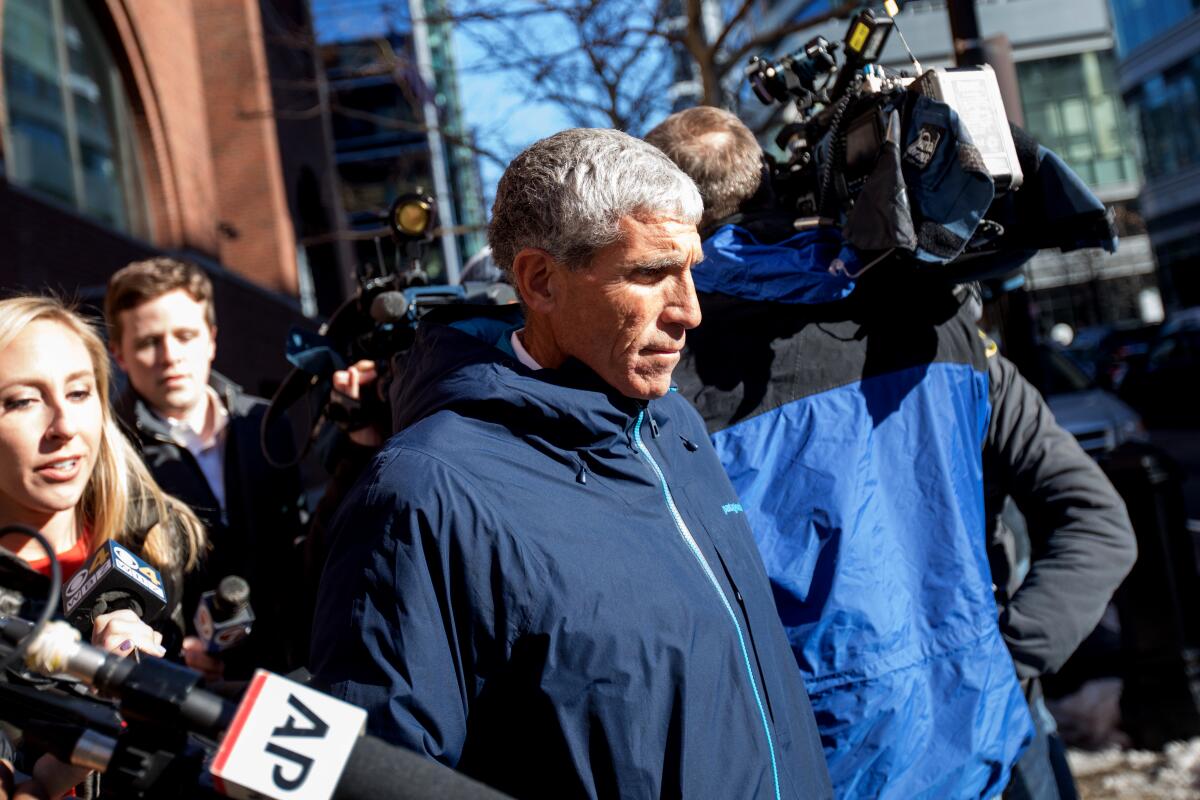College admissions scandal: Rick Singer’s employee to plead guilty to racketeering

- Share via
A woman employed by William “Rick” Singer, the Newport Beach consultant at the heart of the college admissions scandal, has agreed to plead guilty to conspiring to commit racketeering.
In a deal with the government unsealed on Friday, the woman, Mikaela Sanford, acknowledged that she helped fabricate profiles that depicted the children of Singer’s wealthy clients as decorated athletes and took online courses on their behalf.
Federal prosecutors in Boston agreed to recommend a sentence at the low end of a range that calls for 15 to 21 months in prison. In reducing the guideline range by several points, they described Sanford as “a minor participant” in the conspiracy. Her attorney, Oscar Cruz, declined to comment.
Sanford also agreed to forfeit $67,000, the amount that prosecutors said she gained from Singer’s scheme.
Singer, who has pleaded guilty to four felonies, admitted defrauding some of the country’s most elite universities for a decade. He fixed SAT and ACT college entrance exams, created phony profiles that described his clients’ children as promising athletes, and bribed university coaches to advocate for their admission.
Sanford, 34, was indicted last March, entwined in an alleged racketeering conspiracy with a dozen coaches and officials from Georgetown, USC, UCLA and Wake Forest, along with two proctors for the ACT and SAT exams.
Sanford was employed by Singer’s organization, “The Key,” which was in fact two entities: a for-profit business called the Edge College and Career Network, and a purported nonprofit called the Key Worldwide Foundation.
The foundation served little charitable purpose, Singer has acknowledged. He, instead, used it to launder payments from his wealthy clients and dole out bribes to coaches, test proctors and others on his payroll, he has admitted. Its nonprofit status allowed his clients to deduct the bribes from their tax bills.
Sanford, who lived in a suburb of Sacramento, helped create phony profiles for Singer’s clients and took online courses in their names, an indictment alleges. For instance, she retook an online art history class in which the daughter of Robert Zangrillo, a Miami venture capitalist, had earned an F, an FBI agent wrote in an affidavit.
Zangrillo asked if she could also take his daughter’s biology class, and Sanford said she was “happy to assist,” the agent, Laura Smith, wrote in the affidavit. “If you can do the biology thing, just makes sure it gets done as quickly as possible,” Zangrillo told her, according to the affidavit.
Zangrillo has pleaded not guilty to conspiring to commit fraud, bribery and money laundering. He and three others — John Wilson, a financier from Massachusetts; Gamal Abdelaziz, a casino executive; and Homayoun Zadeh, a former USC dentistry professor — had been scheduled to stand trial in October.
On Thursday, however, a judge pushed back the trial to February, citing the unabated COVID-19 pandemic and the difficulties of traveling to meet with witnesses. Most of the witnesses in the case live in California, Texas and Georgia, where coronavirus cases have recently surged, prosecutors told the court.
More to Read
Sign up for Essential California
The most important California stories and recommendations in your inbox every morning.
You may occasionally receive promotional content from the Los Angeles Times.










